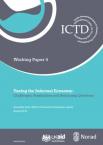ICTD Working Paper 13
Taxes are a basis of national states, but they have been internationally coordinated since the emergence of taxes on income and profits, which were central to the legitimacy of taxation and the increased power of states in the 20th century. This paper traces the historical development of this international system, especially in relation to its interaction with the growth of transnational corporations (TNCs), and analyses attempts to adapt the system to the increasingly dominant role of TNCs in the world economy. It explains and discusses the key principles and concepts (permanent establishment, arm’s length, controlled foreign corporations, transfer pricing), and shows that they have become increasingly inadequate especially following recent renewed economic globalisation. Contributing to current debates on reform of the system, this paper puts forward proposals for an evolutionary shift towards a unitary approach for taxing TNCs.

